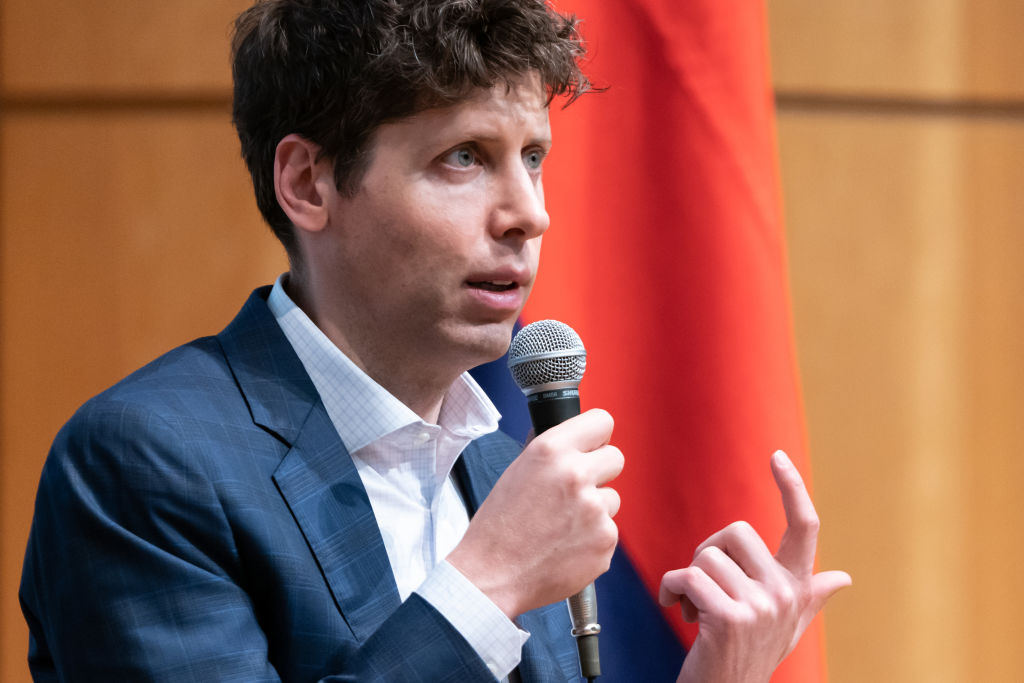
The US Federal Trade Commission has opened an investigation into OpenAI Inc., questioning whether its popular ChatGPT conversational AI bot puts consumers’ reputations and data at risk, according to a person familiar with the matter.
The probe into the Microsoft Corp.-backed startup marks the first official inquiry into a technology that has the potential to change almost every aspect of people’s lives and has become almost equally fascinating for its potential to run awry. FTC Chair Lina Khan, who testified before Congress Thursday, has raised concerns about AI before, saying enforcers “need to be vigilant early” with transformative tools like artificial intelligence.
Read More: OpenAI CEO Sam Altman Is Pushing Past Doubts on Artificial Intelligence
Microsoft declined to comment. In a series of tweets Thursday, OpenAI Chief Executive Officer Sam Altman said “of course we will work with the FTC,” and that it is “super important” to the company that its technology is “safe and pro-consumer.” Altman also said OpenAI is “confident” it’s adhering to US laws.
“We protect user privacy and design our systems to learn about the world, not private individuals,” he said.
The Washington Post earlier reported on the FTC’s probe.
The FTC’s investigation opens a potent regulatory salvo at San Francisco-based OpenAI, the leader in generative AI technology whose ChatGPT app has sparked a race among companies across nearly every industry to develop their own competing chatbots. ChatGPT is built atop a large language model, which is trained on enormous swaths of text from the internet so that it can generate responses to questions in a way that sounds human-like.
The probe “is a significant development that could have implications for both the company and the broader AI innovation sector,” said Divyansh Kaushik, associate director for emerging technologies and national security at the Federation of American Scientists, a non-partisan think tank in Washington. “It signals that regulators are becoming more proactive in ensuring that AI companies operate ethically and responsibly.”
The rapid rise of the technology in the past eight months since ChatGPT become widely available, has prompted calls for regulation and a pause in training of advanced AI systems, even among the heads of some of the leading companies in the field, such as OpenAI, Anthropic and Alphabet Inc.’s DeepMind.
Altman has been an outspoken proponent of regulation. In a May hearing, Altman said Congress should create robust safety standards for advanced AI systems. “If this technology goes wrong, it can go quite wrong,” Altman said. Twitter owner Elon Musk has also been one of the loudest voices warning about the potential consequences of mainstreaming AI.
Read More: What to Know About Elon Musk’s New AI Company, xAI
A prominent tech ethics group filed a complaint in March urging the FTC to halt further commercial deployment of the technology that powers ChatGPT. The complaint from the Center for Artificial Intelligence and Digital Policy, which is led by longtime privacy advocate Marc Rotenberg, called on the FTC to open the investigation and “ensure the establishment of necessary guardrails to protect consumers, businesses, and the commercial marketplace.”
The FTC, which enforces both antitrust and consumer protection laws, is also taking a close look at how competition is developing in the space, Khan has said, to ensure dominant firms aren’t using their power over key inputs like data to discriminate against rivals. The agency is also monitoring how AI tools are being used by scammers and will enforce the law, not just against fraudsters, but also against companies that enable them, she said.
Read More: OpenAI Lobbied the E.U. to Water Down AI Regulation
In a 20-page letter addressed to OpenAI this week, the FTC asked the company to provide detailed descriptions of all complaints it had received of its products making “false, misleading, disparaging or harmful” statements about people, according to the Washington Post. The FTC is looking into whether the company engaged in unfair or deceptive practices that caused “reputational harm” to consumers, according to the Post.
The FTC also asked the company to provide records related to a security incident that the company disclosed in March when a bug in its systems allowed some users to see payment-related information, as well as some data from other users’ chat history.
Read More: Chuck Schumer Wants AI to Be Explainable. It’s Harder Than It Sounds
Khan faced a grilling in Congress on Thursday in a hearing before the House Judiciary Committee, where Republican lawmakers attacked her adherence to ethics laws and aggressive antitrust enforcement, labeled her “bully” and told her leadership was “a disaster.”
—With assistance from Emily Birnbaum, Dina Bass, Rachel Metz and Jackie Davalos.
More Must-Reads from TIME
- Cybersecurity Experts Are Sounding the Alarm on DOGE
- Meet the 2025 Women of the Year
- The Harsh Truth About Disability Inclusion
- Why Do More Young Adults Have Cancer?
- Colman Domingo Leads With Radical Love
- How to Get Better at Doing Things Alone
- Michelle Zauner Stares Down the Darkness
Contact us at letters@time.com